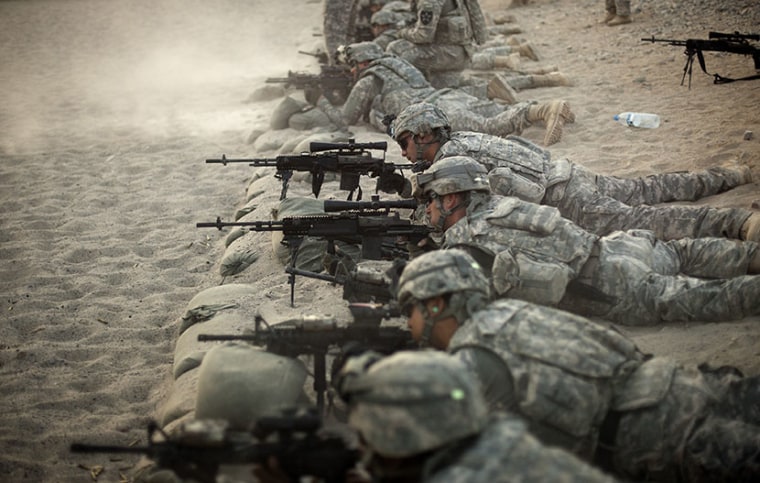There's one U.S. government institution that still criminalizes consensual gay sex: the military.
Two years into the relatively uneventful implementation of the repeal of Don't Ask Don't Tell, it may seem strange that gay and lesbian service members are still technically barred from having sex. Article 125 of the Uniform Code of Military Justice however, is technically still in effect. Article 125 makes it a criminal offense to "engage in unnatural carnal copulation" with "another person of the same or opposite sex or with an animal." With the Supreme Court having struck down anti-sodomy laws nationwide in 2003, a subsequent military court of appeals decision in 2004, and the repeal of Don't Ask Don't Tell in 2010, Article 125 is almost unenforceable, as long as sexual relations don't run afoul of other military regulations like prohibitions on officers sleeping with enlisted personnel. Technically, the language also criminalizes "unnatural" consensual sexual contact for heterosexual service members as well, but it criminalizes any sexual contact for gay and lesbian service members.
"The circumstances under which it can be prosecuted are limited," says Beth Hillman, a law professor at the University of California's Hastings College of Law. "It would be difficult for them to go far without violating Supreme Court precedent." In fact, prosecutions of consensual same-sex activity that don't violate other standards of military behavior ceased during the Bush administration. "Commanders and Judge Advocate Generals do not use [Article] 125 against same sex service members because it simply does not apply. It is moot," says Pentagon spokesperson Lt. Col. Todd Breasseale. "The sole exceptions are when aggravating circumstances exist, like with a child, or if it's by force, or without consent."
Nevertheless, supporters of LGBT rights want Article 125 off the books, saying it stigmatizes gay and lesbian service members. "Article 125 currently includes this prohibition alongside a ban on bestiality," says Ian Thompson of the ACLU. "To say that is stigmatizing and discriminatory to these service members and their relationships is an understatement." Even if you're married, if you're gay, the UCMJ still views your relationship with your spouse as "unnatural."
Several Democratic senators agree that Article 125 needs to change. Colorado Democratic Senator Mark Udall, along with his Democratic colleagues Kirsten Gillibrand of New York and Jeanne Shaheen of New Hampshire, have sponsored an amendment to this year's defense bill that would alter Article 125 so that it no longer criminalizes service members who engage in consensual intimacy with persons of the same sex. The Senate Armed Services Committee approved the Udall proposal as part of the defense bill it sent to the full Senate last week.
"The persistence of it on the books is archaic," says Hillman. "It would be cleaning up the UCMJ to get rid of it, it makes perfect sense to do so."
It doesn't make perfect sense to everyone. The reason Article 125 is still on the books at all is because in 2011, when Democrats tried to get rid of it, the religious right howled that the left was making it acceptable for members of the military to have sex with animals. When Tony Perkins, head of the Family Research Council, got wind of the plan he wrote that "in its rush to accommodate the Left, Congress may have inadvertently opened the door to even more perversion." Asked what they thought of the new proposal to alter Article 125, a spokesperson pointed msnbc to Perkins' 2011 post, titled, "Bestiality Should Give Leaders Paws."
Repealing Article 125 wouldn't have stopped the military from prosecuting bestiality because of rules that prohibit "all disorders and neglects to the prejudice of good order and discipline" and "conduct of a nature to bring discredit upon the armed forces," according to Breasseale. Nevertheless, the uproar was enough to persuade legislators to strip the proposal to remove Article 125, which was approved by the Senate, from the final version of defense bill.
Udall, Gillibrand and Shaheen have taken into account what happened last time around. The new proposal retains prohibitions on "forcible sodomy" and "bestiality," but alters Article 125 so that it no longer criminalizes gay and lesbian service members' consensual sexual activity. Even so, it's not clear that Republicans are any less opposed to altering Article 125 than they were two years ago. Claude Chafin, a spokesperson for the Republican-led House Armed Services Committee, would only say that the Senate should pass the House version of the defense bill as soon as possible, citing an urgent need to approve "substantial reforms designed to combat sexual assault" in the military. The implication is that proposals to amend the bill, like the one that would revise the UCMJ's sodomy ban, should be set aside.
The defense bill will probably get a vote in the Fall, but the proposal to revise Article 125 will likely run into serious resistance in the House, whose version of the defense bill contains language that could legitimize discrimination against gay and lesbian service members in the name of religion. Even if the sodomy ban is unenforceable for now, it maintains at least a symbolic disapproval of gays and lesbians that most Republican legislators agree with.
